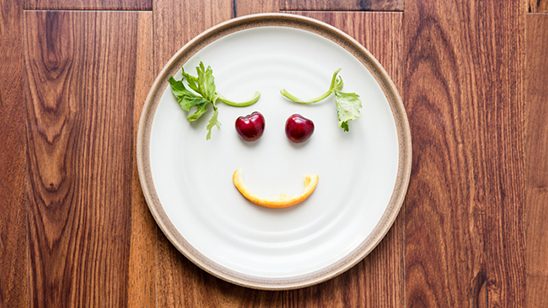- Emotional & Physical Effects
- Anemia and Cancer
- Appetite Changes
- Bleeding and Bruising
- Blood Clots and Anticoagulants
- Body Image
- Bone Health
- Bowel Management
- Cancer Pain Management
- CAR T-cell Therapy Side Effects
- Chemobrain
- Chemotherapy Treatment Side Effects
- Constipation
- Dehydration
- Diabetes Management
- Fatigue
- Hair Loss
- Heart Health
- Immune Checkpoint Inhibitor Side Effects
- Immunotherapy Treatment Side Effects
- Infections
- Lymphedema
- Managing Medications
- Mouth Sores from Chemotherapy
- Nausea
- Neutropenia
- Peripheral Neuropathy
- Pulmonary Embolism and Cancer
- Radiation Fibrosis
- Sexuality and Cancer
- Skin and Nail Changes
- Sleep Loss
- Stem Cell Transplant Treatment Side Effects
- Stress Reduction
- Targeted Therapy Side Effects
- Weight Loss
Appetite Changes
It's not unusual for cancer patients to experience a loss of appetite. Causes include:
- Treatments, such as surgery, chemotherapy and radiation
- Pain
- Constipation
- Medical conditions, such as fever, pneumonia or shortness of breath
- Side effects of certain medications
- Sadness or depression
- Anxiety
Below are some things you could try to be sure to avoid malnutrition.
- Eat small, more frequent meals. Use an alarm clock or TV commercial break to remind yourself to eat.
- Take advantage of times when you’re naturally hungriest, such as first thing in the morning.
- Do light exercises to stimulate your appetite.
- Keep ready-to-eat foods on hand at home and with you on the go.
- Drink nutritional shakes, such as Ensure or Carnation Instant Breakfast.
- Limit fried and greasy foods. They can be difficult to digest and make you feel full quickly.
- If you aren’t able to stimulate your appetite, talk to your physician. You may be prescribed an appetite stimulant.
Taste and smell changes
Patients who are receiving chemotherapy or radiation therapy may experience changes in taste and smell, which can make eating difficult. Below are some tips to help make food more appetizing.
- Drink plenty of liquids. Use fruits or herbs to flavor water. Consider trying decaffeinated herbal teas or ginger ale.
- Take care of your mouth. Brush your teeth and tongue after every meal. Rinse with a solution of ¼ teaspoon baking soda in 4 ounces of water before eating.
- Sorbet (lemon or lime) or frozen fresh fruits (grapes, melons or oranges) can help cleanse your palate before eating.
- Try sugar-free gum, peppermints or lemon drops.
- If you have a metallic taste in your mouth, use plastic utensils and avoid canned foods.
- Marinade and cook meat in sweet juices, sauces, fruits, acidic dressings or wines.
- Include other protein sources in your diet, such as fish, eggs, beans, nuts, milk, cheese, yogurt, tofu, peanut butter and protein powders.
- If foods taste salty or bitter, increase sweet tastes by adding honey, agave, maple syrup and jam to foods.
- If foods taste too sweet, increase salty or tart flavors by adding citrus fruits, vinegar or pickled foods.
- Try seasonings you don’t normally eat.
- To decrease food smells, eat foods cold or at room temperature. Try soups in a covered container and sipping it with a straw. Avoid rooms where food is being cooked.

What to know about fasting during cancer treatment
Diet plays an important role in supporting your body during cancer treatment.
Yet there are many reasons why someone in cancer treatment may be interested in fasting, or periods of not eating. These reasons might include health goals or religious observation.
We spoke with MD Anderson nutrition experts to discuss what cancer patients need to know about fasting during treatment.
Is fasting safe for cancer patients?
Clinical dietitian Juhina Farooki says the question of whether fasting is safe for cancer patients needs to be answered on a case-by-case basis.
“Every patient is different, and what could be safe for one patient is not necessarily safe for the other patient,” she says.
One risk of fasting during cancer treatment is malnutrition, or a lack of nutrients. This can lead to weight loss, contribute to fatigue and slow the healing process.
Fasting can also make it challenging to get the nutrients you need if you’re dealing with side effects such as nausea, vomiting and loss of appetite.
Fasting during cancer treatment may also add stress to an already stressful time.
“A personalized and guided approach is necessary if you want to fast while you’re receiving cancer care,” says Meroë Morse, M.D., who works with patients in MD Anderson’s Integrative Medicine Center.
Morse and Farooki both stress that cancer patients who are fasting or want to fast should do so under the supervision of medical professionals. This will ensure they get adequate nutrition, maintain a healthy weight and avoid malnutrition.
What should cancer patients know about fasting for religious reasons?
Many religions incorporate some form of fasting. However, Gale Kennebrew, director of Spiritual Care and Education, notes that many religions allow exceptions from fasting if it impacts a person's health.
Kennebrew says an MD Anderson chaplain can help patients discuss any concerns about fasting during treatment with their religious leaders.
Even if you are advised to avoid fasting for religious purposes during cancer treatment, Kennebrew says there are alternatives to spiritual fasting.
“Concerned patients should consult with their religious or spiritual leaders for ways to observe the spiritual discipline of fasting during cancer treatment,” she says.
What should cancer patients know about intermittent fasting?
Intermittent fasting means only eating between certain hours of the day and fasting for the rest. It includes time-restricted eating.
Patients who practice intermittent fasting with proper guidance can see benefits, Farooki says. These benefits include blood sugar control, better mental clarity and more energy.
She explains that when you eat, your body releases insulin – a hormone made in the pancreas – to lower the amount of sugar in your blood.
“Periods of fasting will decrease the amount of insulin circulating in the bloodstream because it will not be needed as often,” she says. “It also lowers the risk of developing certain diseases like pre-diabetes.”
While Farooki says intermittent fasting may also support weight loss efforts, patients in cancer treatment should speak with their care team about their weight loss goals to determine the best way to proceed.
Morse says more definitive research on fasting and cancer treatments in humans is still needed.
“This is an area of great interest for patients and clinicians alike,” she says.
This is for good reason. Morse says time-restricted eating may help patients achieve better energy balance and body composition after cancer treatment.
Additionally, she says fasting correctly has been shown to reduce inflammation, enhance cellular repair and stabilize certain hormone levels, which can benefit metabolic health, recovery and longevity.
“Still, patients should consult with a registered dietitian before fasting to ensure that the plan they intend to follow will still support their body’s nutrient and energy needs,” she says.
No matter when you choose to eat, Farooki says it is important to ensure you’re meeting your nutritional needs.
“If the patient’s not eating well to begin with, intermittent fasting won't be the best option for them,” she says.
MD Anderson dietitians recommend eating meals rich in whole grains, vegetables, fruits, beans, nuts and seeds.
“The goal is for humans to get adequate calories, protein and fluids, regardless of when you eat. It doesn't have to be three times a day with snacks in between,” Farooki says.
Request an appointment at MD Anderson online or call 1-877-632-6789.
request an appointment online.
Help #EndCancer
Give Now
Donate Blood
Our patients depend on blood and platelet donations.
Shop MD Anderson
Show your support for our mission through branded merchandise.







